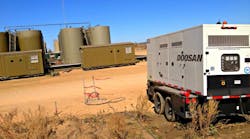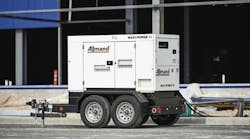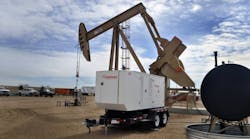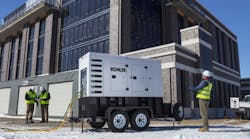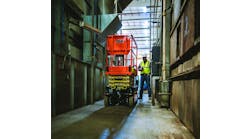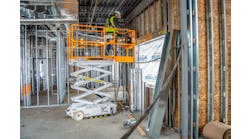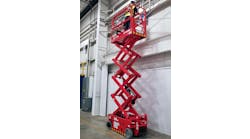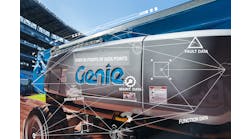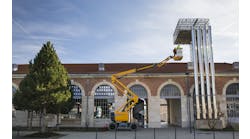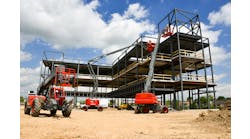Todd Howe, product manager - generators and light towers, Doosan Portable Power, talks about the growth and integration of telematics in rental, load-management technology, how energy storage technology can enhance fuel efficiency, building a disaster response program, consolidation in the rental industry and a lot more.
RER: What is new technologically for your company in generators?
Howe: We are working on two fronts. One is the continued emergence of telematics systems and the integration of telematics systems. Telematics systems have been around for a good long while, but there has been much more customer adoption recently, so we’ve been hard at work making the ability to integrate systems into our units. We’re also working on our own strategy internally in terms of having an offering to provide the customers that need it, but I’d say the short-term focus has been to make sure our units are capable of working with the variety of third-party telematics systems that are out there in the marketplace.
The other area we’ve been working hard at is load-management technology, as the world has made the transition to Tier 4. There have been some application challenges to Tier 4, especially light load and cyclical applications, which are very common real world uses for mobile gensets and rental gensets particularly.
We’ve been working on ways to provide a good mitigation for light load operation that’s built into the machine. That way we don’t have to deal with external solutions like load banks, and you don’t need to be dealing with the constant service calls and downtimes that might be associated with machine operations when you’re running light loads. We’ve developed our intelligent load-management systems. It started making its way into the larger end of our product line a couple of years ago, and it’s been very successful, so we’ve been adapting that technology into other parts of our product range. It’s coming out soon in our mid-range products – G70, 125 and 150 – and, ultimately, we’ll be offering a solution that covers the entire product range as we continue to work forward in our development.
So we see load management as being a necessary requirement for our customer base because we are so focused on the rental market and rental type applications and we feel load management is an essential part of the mix these days to provide the ultimate in reliability and uptime for customers and take the concern away from a rental owner or operator that they have to do a tremendously detailed job of sizing the machine or risk the potential of the machine having downtime because of light load conditions.
What are the latest trends and developments in generators for the rental market?
Howe: One of the things we’re interested in from a research and development standpoint is energy storage. Certainly, with the emergence of battery technology in commercial application, whether it be automotive or residential storage with solar systems and things of that nature, battery technology continues to improve and become more cost-effective. I can see a day, in the not-too-distant future, within the five-year window, where we can package an energy-storage solution with a mobile generator and the benefit of that would be we could do bigger applications with smaller generators because you’ve got that energy storage that can provide a boost. We can provide increased efficiency, because when we’re running a light-load application now we can run on stored energy and reduce the usage of the diesel engines and consume less diesel. There are a lot of different ideas out there that can be that next new wave of new technology entering our market space.
RER: What types of trends do you see coming in the near future in generators?
Howe: The reality is we’ve gotten to the last wave of engine emissions-driven product changes for a while. We don’t see any new emissions standards coming on the horizon for the North American market so the next wave of work is going to be customer-focused innovation and one of the top things that customers always tell us is reliability and efficiency. The reliability comes in with energy storage because we can provide very clean power output with energy storage in a way that is as good or better than the utility grid supplies. And the efficiency piece is if I can optimize fuel consumption by using the diesel engine at its most efficient operating point, and then shut that engine off and run off the stored energy when demand allows that to happen, it gives that customer some benefit in terms of fuel cost and fuel consumption.
We are just around the beginning of hurricane season. What advice would you give to rental companies about how to prepare for the impact of major storms?
Howe: [At the time of this discussion] we just managed our first storm of the year. Here in the western part of North Carolina we had a lot of heavy rain for a lot of days, so we’ve been dealing with some flooding. I would say it’s going to be an active season again. Now is not the time to be doing your planning, your planning needed to be done six months ago so you’re ready to go now because the season is here. It’s going to be a bit wild and unpredictable, and certainly going to be very difficult now to put a plan in motion if you haven’t already done that because product lead times are stretched out again, it’s hard to get hands on equipment if you don’t have it already in your plans.
I always give the advice to plan early, plan often and revisit your hurricane plans on a periodic basis. These are living, breathing plans and they evolve and change as conditions in your marketplace change, as customer needs might change. You can’t just say we’re ready to go, we’ll do what we did last year. We’re always talking to customers to make sure their expectations haven’t changed, that their needs haven’t changed. A customer may have needed a 20-kilowatt machine from you last year to ride out the storm, but his operation may have changed and now he needs a 50-kilowatt machine. And that puts you up against the wall if you don’t have that available to offer. It’s always important to make sure that you’re ready but also checking in with your customer to make sure they’re ready as well.
As hurricane season begins, what do you as a manufacturer do to prepare?
Howe: We started a good long while ago with a lot of discussions with our dealer partners out there especially in the areas that are likely to be impacted by events and natural disasters. We say “Here’s what we’re seeing, get your orders to us early if you need fleet this year, if you’re expanding fleet this year, replacing fleet this year, get us your orders in the early part of the first half of the year so we’ve got a chance to get those to you and not have you being impacted by the extended lead times that are starting to happen in the industry.”
What are the basics that rental companies should know if they want to be successful in generator rentals?
Howe: I share this all the time especially when I’m out in the world doing product training: Just know your customer. Your customer has needs but sometimes the customers cannot articulate what their needs are because they don’t understand power, they don’t understand generators, or they don’t understand the uniqueness of running a business on generator power instead of utilities. So ask customers a lot of questions to make sure you understand what their needs are so we can provide the best solution. When I say “we,” I mean the industry because it’s multi-faceted. It’s what the dealer brings to the table, it’s what the manufacturer brings to the table, that’s all part of how the customer’s need gets met. Pay close attention to what the customer is trying to do to get his job done and his work done.
What trends do you see in generator rentals?
Howe: Certainly, trends of consolidation will continue in the rental space. We’re seeing it specifically in the generator market, a lot of the big national companies are putting specialized focus on power rental whether it’s a pump-and-power situation or a power and HVAC situation, where they are creating specialized branches, specialized teams because they understand the uniqueness sometimes of these applications. We’re also seeing that they continue to swallow up the specialized independent players that are out there, so we see that consolidation continuing.
